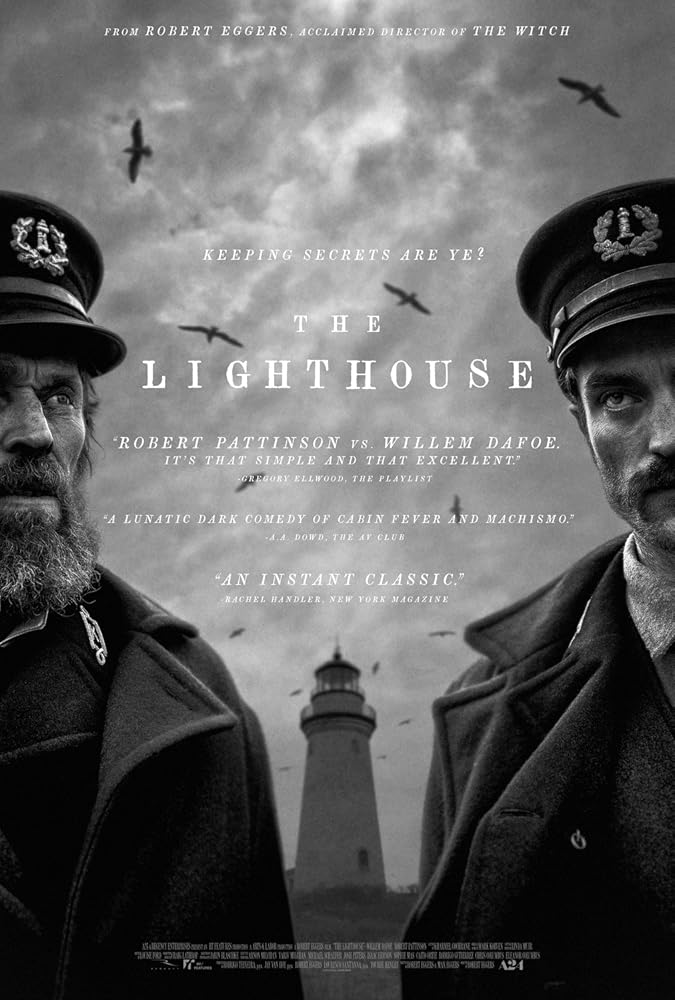
The Lighthouse (2019)
Written by Robert & Max Eggars. Directed by Robert Eggars.
As anyone who comes here regularly would know, I watch a lot of movies. Sometimes they are perfectly fine while up on the screen but don’t stay with me, and within hours I need to refer to notes made in the cinema to jog my memory into writing a review. Not so with Robert Eggars’ latest film – I found it truly memorable and cannot stop thinking about it!
The Lighthouse is many things, which makes it difficult to adequately describe without giving away massive plot spoilers – which I have no intention of doing. Suffice it to say, I found this seemingly simple story of two men alone in a lighthouse a riveting cinematic experience that becomes increasingly complex and deep. From the opening scene, this is a film that demands your full attention and becomes (at times) uncomfortably intense.
Willem Dafoe and Robert Pattinson star in this two-hander and both are excellent. I’ve come to expect this of Dafoe, who never disappoints, but Pattinson is extraordinary here and has become an actor of depth and serious value. There is surprisingly little dialogue between them but that is delivered with intent and tension. For a relatively quiet film, it’s very loud, with superb diagetic sound and a score that weaves through this isolated and desolate world.
For film nerds (like me), the movie was shot on 35 mm black and white film stock, using vintage Baltar lenses, which required much stronger lighting for the interior scenes, creating deeper contrasts and also forcing the almost square 1.19:1 (or Movietone) aspect ratio. This makes so much of the film ultra close up and at times, downright claustrophobic despite being so isolated. There are many seemingly small things like this that combine together to make this film a cinephile’s delight – the haunting sound design, the very specific dialects used by the actors, the atmospheric score by Mark Korven, the brilliant cinematography by Jarin Blaschke, and the superb editing by Louise Ford. All combine together to make a truly memorable cinematic experience.
Narratively, the story was drawn initially from an unfinished work by Edgar Allen Poe and a real-life incident from an early 19th century Welsh lighthouse. But at its heart, I think this has more in common with Greek tragedy – particularly Proteus, the prophetic sea god and Prometheus, the trickster who stole fire from the gods and was punished so horribly. Set in the late 19th century, this is a period piece that doesn’t exclude modern viewers. There are strong themes of the performative nature of work and masculinity, which are relatable audience entry points and become so very obvious as the layers of social norms are stripped away from the characters and their true natures revealed. And above all, the lighthouse – which almost becomes a character itself, in all its intense and claustrophobic isolation.
At times, The Lighthouse is a hard watch and if you’re not a fan of being challenged by a piece of cinema, I cannot recommend it to you. However, if you like horror that is cerebral as well as visceral, you’ve come to the right place. If there is a fault, it is a little over-long with a running time of 109 minutes, but I wonder now if that was intentional. Like Eggars’ previous feature, The Witch (2015) there are questions posed that are never answered. The existential horror at the core of this drama is arguably something that exists in all of us and here, Robert Eggars in concert with his excellent cast and crew, gradually peel away the artifice of societal expectations to reveal that dark heart.
The Lighthouse is currently in (relatively) wide release across Australia and I’d like to thank Monster Fest for the opportunity to see and review it.
2 Comments (+add yours?)